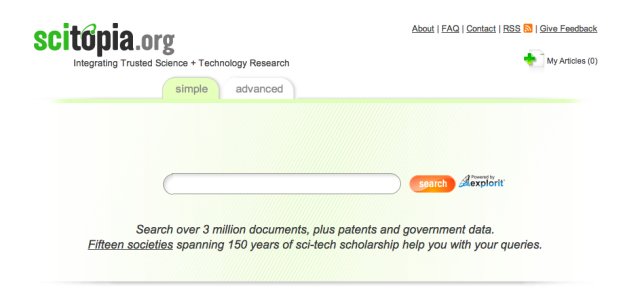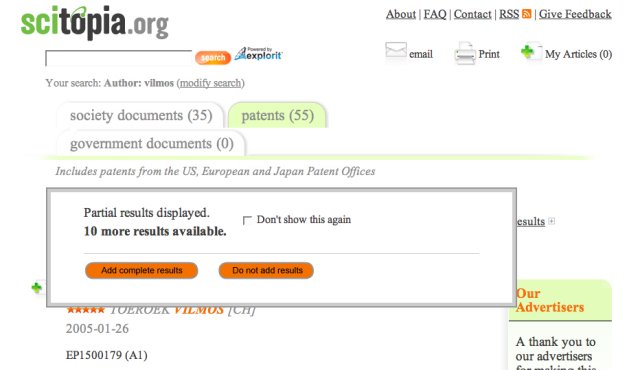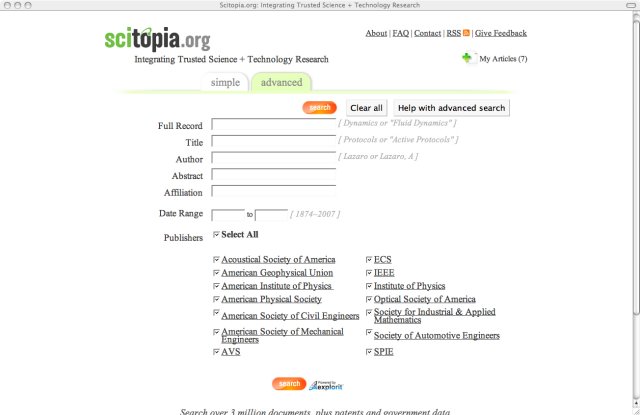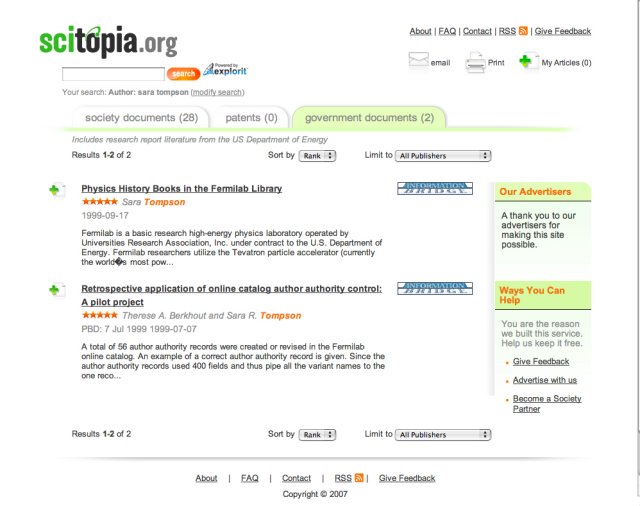| URLs in this document have been updated. Links enclosed in {curly brackets} have been changed. If a replacement link was located, the new URL was added and the link is active; if a new site could not be identified, the broken link was removed. |
Electronic Resources Reviews
Scitopia
Science and Engineering Team Leader
USC Libraries
University of Southern California
Los Angeles, California
sarat@usc.edu
| From the Scitopia web page:
An important message regarding Scitopia.org The Scitopia partner societies regret to announce that the Scitopia free federated search portal has been discontinued. All of the Scitopia partners wish to thank our users for their support over the last few years, and we encourage you to visit the sites of the society partners for the best scholarly content in science and technology. |
Introduction
Scitopia was collaboratively developed by a group of science and engineering societies as a federated search tool for their journal literature, as well as some patent resources. The search engine product is carefully marketed as collaboration. Thus it is not possible to determine if any one organization was a lead. But certainly IEEE and the Institute of Physics (IOP) were early announcers. A review of SEC-EDGAR, Hoover's and the Business and Company Names databases did not yield any information on Scitopia as a discrete organization. The {Scitopia site} lists Beth Dempsey of Dempsey Communications Group as the media contact; a web search indicates Dempsey has done publicity for various library organizations, and has written for Library Journal.
IEEE hosted a Scitopia luncheon "beta launch" luncheon event at the Special Libraries Association (SLA) conference in Denver last June 3, 2007, which I, and close to 100 others, attended. IEEE representative Karen Hawkins' slides from that event are available at {IEEE's site}. I have occasionally used and recommended this access tool since that introduction to it. In October 2007, Scitopia announced the emergence of the product from beta.
It is a bit too early to tell if this product will succeed, as Scitopia is less than a year old, and, most of the articles in the Scitopia organizations' literature are already indexed elsewhere, including in some of their competitors' tools. Nevertheless, it has some utility as a way to access science (especially physical science) and engineering literature, and warrants a closer look.
Developers and Content Targets
The societies behind Scitopia, and the literature of which is searched by the tool, are mainly physical sciences and/or engineering organizations: Acoustical Society of America (ASA), American Geophysical Union (AGU), American Institute of Aeronautics and Astronautics (AIAA), American Institute of Physics (AIP), American Physical Society (APS), American Society of Civil Engineers (ASCE), American Society of Mechanical Engineers (ASME), American Vacuum Society (AVS), The Electrochemical Society (ECS), The Institute of Electrical and Electronics Engineering (IEEE), The Institute of Physics (IOP), The Optical Society of America (OSA), the Society of Automotive (and Aerospace) Engineers International (SAE), the Society of Industrial and Applied Mathematics (SIAM), and SPIE, an optical society (formerly the Society of Photographic Instrumentation Engineers). Paragraphs on each of the {participants} are provided. In my opinion, Scitopia is an outgrowth, in some ways, of the Scitation search platform maintained by AIP and others, and in use as the search appliance for AIP, APS, ASME, ASCE and other societies, since at least 1996 in some format.
The principal content searched is the bibliographic records of the literature of the participating organizations. In addition, Scitopia also searches three patent servers: the US Patent and Trademark Office, European Patent Office (presumably their esp@cenet free server, and the Japan Patent Office (probably their Industrial Property Digital Library. A more recent addition is the Department of Energy Information Bridge site, a freely accessible resource that covers a range of technical reports and other documents from the Department and contract laboratories, hosted by the Department's Office of Scientific and Technical Information.
Searchability
Federated search is purported to be very popular, especially with university and college students (see, for example, the recent special issue of Internet Reference Services Quarterly devoted to the topic -- volume 12, number 3/4, 2007). The federated search approach is often not as popular with librarians (including this reviewer!) because one perforce loses some options for very granular searches when accessing multiple target sources with varying fields or access points. But librarians need to be conversant with the federated tools our patrons are using.
In addition to the federated approach, Scitopia is also an example of a group of smaller publishers collaborating to compete with some of the larger publishers' search platforms like Elsevier's Engineering Village 2 or the American Chemical Society's SciFinder Scholar, that also include some of the freely accessible patent and other technical literature. The virtue of Scitopia is that the search engine is free; EV2 and SFS are expensive subscription products.
Scitopia intends to be supported in part by advertisers. However, as of this writing (February 2008), there are no advertisers listed on the site.

Scitopia opens with a very simple search screen and one search box. This is the "one-search" Google model that is probably even more popular, certainly with younger searchers, than "federated search." As one researcher has noted, "Millennials are now conditioned to expect one search box gateway to all knowledge" (Sweeney 2005).
Scitopia displays an oval search progress bar with a countdown of the number of sources searched. This is a very helpful feature.

A rather confusing feature is the option given halfway through many searches (apparently over a certain number of results) -- a "partial results" dialogue box that asks whether one wants to "add complete results." Sometimes Scitopia presents this option more than once! It is a feature that allows one to stop at a smaller results set (often only the society publications), but I think it could be frustrating to some searchers, especially those accustomed to the Google model of returning all results.
Advanced search, like many federated products (e.g., Webfeat implementations such as my institution's {Scholars Portal}) provides the search field(s) input boxes at the top of the web page, and defaults to having all the targets searched. A searcher must manually de-select sources not desired for the search.

One can choose to modify a search by clicking on that option at the top of the results screen, in a text line that displays the current search input (another useful feature). This line of text and the refine option are easy to find and read. "Modify search" returns one to the original search page.
Boolean "and" is understood to link the concepts when a user types in two terms. Exact phrases must be enclosed in double quotation marks. Operators used are those common to many search engines, e.g., "*" for wildcard truncation, "?" for one character wildcard, parentheses to manage Boolean order, and so on. The instructions on the help page (no direct url visible) are clear and include examples.
The results screen is clear and readable, and defaults to "society documents," which includes "journal articles, conference papers, standards and other content." The results are sorted into two additional types, accessible by tab displays: "patents" and "government reports." The citations are listed with a graphic of the source as a "brand" on the right hand side. The graphic is a clickable link to that society publisher.

An article opens in the same browser window as the Scitopia search by default. Thus a user must use a mouse click in order to direct the browser to open the link in a new window (or tab).
The "My results" feature could be misleading -- one cannot set up an account as in many other search engines -- results are only saved for the current session. Similarly, the RSS feed link goes to a page explaining how many of the participating societies have RSS feeds as an output option on their sites; Scitopia does not offer this service.
Content
Society Publications
For a test search of the society publications, I chose to look for "Operators with large quantum numbers, spinning strings, and giant gravitons," a 2005 publication by USC string theorist Clifford V. Johnson and his student Veselin Filev. I typed "gravitons" in the title box of Scitopia's advanced search, and "Johnson" in the author box. This Physical Review D publication appeared at the top of the list! Scitopia does seem to employ a relevancy-ranking scheme.
When I did this search from a campus computer, and from my home computer with a VPN client running to authenticate me as a subscriber, a click on the title link led right to the article. This is another useful feature of Scitopia -- direct linking to articles for subscribers. If I had searched for this article in, for example, INSPEC on Engineering Village 2 on my campus, the link would have led to our open URL link resolver intermediate page, and one more click would have been required to get to the article itself. So Scitopia can be a quicker, federated, way to access a range of science and engineering society publications for subscribers to those publications (it removes one click step).
A Scitopia search on Professor Johnson's articles by author yielded 208 initial results; I chose not to add the 887 more available. The results displayed in reverse chronological order, the newest first, in this case a 2005 article in Physical Review D, so both relevancy and date rankings are employed by default. Even without using campus authentication, the clickable title link went right to the article abstract page. At which point I could not get the full text without subscriber authentication, or without purchasing it. This points out an alternative strength of Scitopia -- it could be a useful search engine for smaller institutions or companies that do not subscribe to the target society literature -- they could at least get to the abstracts and then make individual purchasing decisions.
One oddity occurred in one of these test searches -- when I returned to Scitopia from the APS page, the results set had morphed into all publications by "Johnson," not modified by "Clifford" or "CV"! Some sort of bug may occur when backing up to search data?
Patents Access
I did a test search for several patents by a US inventor for types of field effect transistors. The patent "Power MOSFET with ESD protection," European #EP1355354, Inventor Bankuti Vilmos, of New Bedford, MA (2003) is retrievable in esp@cenet. The EPO patent is an offshoot of Vilmos' and Chagnon's 2002 US patent #6,420,762, "Integrated electrostatic protective resistor for metal oxide semiconductor field effect transistors (MOSFETs)," which is retrievable on the USPTO server, but not via esp.
I searched Scitopia using Vilmos' name as the author. It found the European patent, but none of his US patents.
Note that EPO's esp@cenet database also crawls a number of other sources when the "worldwide" category is selected, including the USPTO, French, German, and UK servers, and others, so if one is looking for a federated patent gateway, this would be more direct than Scitopia.
I was not able to obtain useful search results from the Japan Patent Server, which does not allow inventor or title searches directly. Thus I was not able to test Scitopia as an entry point to that literature.
DOE Reports Access
For DOE, I tried Scitopia to search for a document known to reside in the Information Bridge server, "Digitizing Legacy Documents: A Knowledge-Base Preservation Project" (a Fermilab grant project report for which I was one of the coauthors). Two different searches yielded separate results! When I searched my name in the author box without quotations around it, two results were retrieved, not including the intended result. When I searched my name as a phrase in the Full Record input box, the legacy documents publication was retrieved, along with a different report.
The differing results could be due in part to DOE indexing. However, these searches seem to indicate that Scitopia searches author fields and full record fields differently, and/or that phrases are sometimes understood, but not always.
These test searches point out both some strengths in Scitopia (including few-clicks access to the primary literature and application strengths for both small and large organizations) as well as some problems (incomplete search results when the result set is known to be larger, as well as some seeming internal errors when one navigates back to a results set). I think it is clear that Scitopia is still a new product, and some "kinks" need working out.
A Few Technical Notes
Scitopia.org is powered by Deep Web Technologies' "Explorit Research Accelerator" federated search engine. The company's web site notes they developed their search approach in part by working with DOE OSTI. The OSTI Info Bridge server is one of Scitopia's search targets, as discussed above. The "Research Accelerator" includes both a crawler and an indexer, and is also used by the Science.gov site.
Scitopia is said to be "{fully compatible}" with these operating systems and browsers: Internet Explorer 6 and 7 on Windows, Safari 2.0 on Macintosh, and Firefox 1.5 and 2.0 on Mac, Windows and Linux machines. The Linux compatibility is a savvy move for a sci-tech search engine, as many scientists and engineers, especially in academe, use Linux machines. This reviewer tested it using Internet Explorer on a Windows machine, and Safari and Firefox on a Macintosh, and it performed the same on all the platforms.
Some Additional Comments and Conclusion
Scitopia has begun a consistent track record of advertising to and working with librarians -- note the launch at SLA described above. In addition, Scitopia has a Facebook group "Scitopia.org" administered by Karen Hawkins of IEEE, and launched in January 2008. (The URL for the group is dependent upon one's affiliated institution.) The purpose of the group is stated thusly: "This group is for any researcher or librarian with an interest in searching Scitopia, and any of the partner societies who want to share information." As of February 2008, the group has 41 members, mainly sci-tech librarians, many of whom are SLA members.
To reprise some earlier comments, Scitopia is quite a new product. In my opinion it is too soon to predict its long-term success. It is strongest as a federated search engine for its member societies' literature, and could be even better if some apparent anomalies are corrected. The patent and DOE literature searches are a value-add to Scitopia, but not without some problems and limitations as described above.
I see that Scitopia could be particularly useful for users of smaller academic and/or corporate and special libraries in science and engineering disciplines, as a way to get to a cross section of the literature for free (one would then purchase articles on demand). I would have utilized it thusly when I was running a corporate engineering library that billed back research to client jobs.
Additionally, Scitopia can be a useful gateway to a range of the sci-tech society literature for larger academic institutions. This would be particularly true if it is marketed as a way to reach the literature with fewer clicks than some other subscription database entry points.
References
Sweeney, R.T. 2005. Reinventing Library Buildings and Services for the Millennial Generation. Library Administration & Management 19(4): 165-75.
| Previous | Contents | Next |
